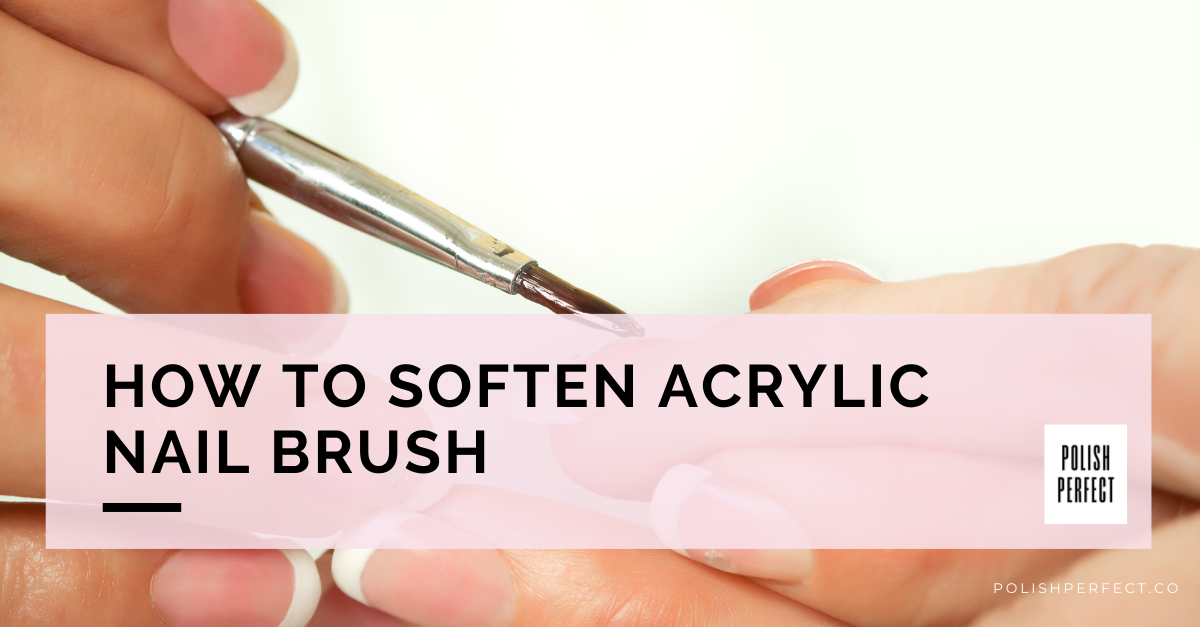A brush softener is your secret weapon to restore the flexibility of your brush bristles.
Just like your favorite recipe, follow the instructions on the package to a tee. Before you know it, your brush will be as soft as a cloud.
So, you’ve got a hardened acrylic nail brush on your hands.
Not quite the situation you were hoping for, huh? But don’t worry, I’ve got you covered.
I’ve picked up a few handy tricks to bring your brush back to life.
Here’s a guide on how to soften acrylic nail brush to ensure that your designs are flawless.
Getting to Know Acrylic Nail Brushes
Acrylic nail brushes are like the magic wand in your toolkit. They hold the power to transform ordinary nails into extraordinary works of art.
But, as all nail technicians know, with great power comes great responsibility. One of the most common problems we face?
Hardening of the brushes. And trust me, nothing can halt creativity faster than a hardened brush.
The Importance of a Soft Acrylic Nail Brush
The flexibility of a soft nail brush is crucial.
A hard brush can lead to uneven application and a less-than-perfect acrylic nail job.
It’s like trying to paint a masterpiece with a stick instead of a paintbrush – not quite the same, right?
Identifying Hardened Nail Brushes
Now, how can you tell if your brush is on the brink of becoming hard? Pay attention to these tell-tale signs:
1. The bristles are stiff and unyielding.
2. The brush struggles to hold acrylic liquid.
3. The application of the acrylic becomes uneven and lumpy.
Did you spot any of these signs? If so, it’s time to act fast!
A hardened nail brush can cause significant damage, not just to the brush itself, but also to your nail art.
Why Do Acrylic Nail Brush Harden?
Why do acrylic nail brushes harden, you ask?
It’s usually due to dried acrylic residue. Each time you dip your brush into the acrylic liquid and then into the powder, a small amount of acrylic gets left behind.
Over time, this builds up and hardens, causing stiff, uncooperative bristles.
How to Soften Acrylic Nail Brushes
Don’t fret if your brush has hardened. There are ways to soften it!
So, how exactly do you go about softening your acrylic nail brush? Let me walk you through it:
Step 1: Cleaning the Brush
First things first, clean the brush. A clean brush is a happy brush! Use a brush cleaner to remove any acrylic residue.
Remember, regular cleaning is crucial to maintain the softness of the brush.
Step 2: Using a Brush Softener
You might be wondering, “What the heck is a brush softener?” It’s basically a product that helps restore the flexibility of the bristles.
Just follow the instructions on the package, and your brush will be soft in no time.
Step 3: Storing the Brush Properly
Okay, your brush is squeaky clean and soft. But how do you keep it that way? Proper storage is key.
Store your brushes in a cool, dry place, and avoid leaving them in the sun.
Gentle Cleaning Tips
Cleaning your brush gently yet thoroughly after each use can prevent hardening.
Use a brush cleaner designed for acrylic brushes and rinse thoroughly with warm water.
We do not recommend using strong substances like pure acetone or alcohol for regular cleaning, but in case you have no choice, you should do it with care.
Here are some alternative ways to soften your brush when brush cleaner or monomer liquid is not available.
Alternative Softening Methods
There are various ways to soften a hardened acrylic nail brush. The most popular method involves using acetone.
(If you’re not interested in using acetone go here).
But remember, this method should be your last resort.
Regular cleaning and maintenance should always be your first line of defense! But more on that later.
The Last Resort: Acetone Method
Acetone, a potent and effective solvent, is a go-to for many nail technicians when it comes to softening brushes.
Here’s a simple step-by-step process:
1. Fill a small, glass dish with enough pure acetone to cover the bristles of your brush.
2. Immerse your brush in the acetone for around 10 minutes.
3. After soaking, gently swipe the brush on a lint-free wipe to remove any residual acrylic.
Remember, while acetone is effective, it’s also strong.
Overuse can lead to the breakdown of your brush’s bristles, so use this method judiciously.
The Gentle Touch: Soap and Water Method
For those who prefer a gentle approach, soap and water can also do the trick.
1. Swirl your brush in warm (not hot) soapy water. Dish soap works best due to its grease-cutting properties.
2. Rinse thoroughly with clean, warm water.
3. Pat dry with a lint-free towel.
This method may take longer, but it’s a safer option for prolonging the lifespan of your brush.
Preventing Hardened Nail Brushes
Prevention is better than cure, as they say. Regular cleaning and proper storage are your best bet to prevent your brushes from hardening.
And remember, always treat your brushes gently. These are delicate tools, and harsh handling can damage the bristles.
Understanding the Art of Brush Maintenance
As any seasoned nail technician knows, maintaining your acrylic nail brush is more than just a chore, it’s an art.
And part of that art involves knowing how to soften your brush. But where do you start? Well, to paraphrase a well-worn saying, a clean brush is a happy brush.
1. Clean Your Brush Like a Pro
First in line in the brush softening process is giving that brush a good, thorough clean.
Think of it as a spa day for your brush, minus the cucumber slices and Enya music.
Get hold of a quality brush cleaner and dedicate some time to removing stubborn acrylic residues.
Wait, did you think you were done? Not so fast!
You see, cleaning your brush isn’t something you do once and pat yourself on the back. It’s an ongoing process, just like maintaining good oral hygiene.
Here’s our article on how to clean acrylic nail brush for more details.
2. The Dentist Analogy: Why Regular Cleaning is Crucial
Let’s put it this way: You wouldn’t brush your teeth once and expect them to stay squeaky clean forever, would you?
Of course not! The same logic applies to your brush. Regular cleaning is not just important, it’s vital if you want to maintain the softness of your brush.
The takeaway here? Regular cleaning is to your brush what a dentist is to your teeth- an absolute necessity.
In fact, consider this a friendly reminder to schedule your next dental appointment while you’re at it!
3. Turning Cleaning into a Routine
So, how often should you clean your brush?
Well, there’s no one-size-fits-all answer. It depends on the frequency of your brush usage, the type of acrylics you work with, and the quality of your brush.
But as a rule of thumb, a quick clean after every use and a deep clean once a week can do wonders for your brush’s lifespan.
Remember, your brush is more than just a tool. It’s your partner in the quest to create beautiful nails.
Treat it with the care it deserves, and it will reward you with excellent results every time. So, roll up your sleeves, and let’s get cleaning!
Final Thoughts
So, there you have it. A straightforward guide to softening your acrylic nail brush.
Remember, regular cleaning, proper use of a brush softener, and correct storage are key to keeping your brush soft and ready for action.
If you found this guide helpful, why not share it with your fellow nail enthusiasts on social media?
Or leave a comment below with your thoughts and any additional tips you may have. We’d love to hear from you!
Happy brushing!


